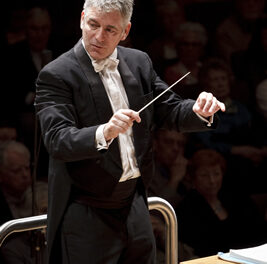The Chamber Choir of the Choral Society of Durham is comprised of 40 singers chosen from the larger organization. Some of them have had professional training, several have solo capability and all contribute to a choral blend that conductor Rodney Wynkoop has determined to be near ideal. Thus a concert by this group is always special and a joy to hear, especially this one titled, “A Night in Vienna.”
Performing in Duke Chapel with a small chamber orchestra made up of outstanding local musicians, the concert began with a marvelous treasure from the pen of the mature, confident Beethoven at the height of his creative power; “Elegischer Gesang” (Elegiac Song), Op. 118. The brief poem is conjectured to have been written by his landlord, Baron Johann Baptist von Pasqualati after the untimely death of his 24 year old wife. Beethoven set it to music for chorus and string quartet as a mark of affection for his friend and a consolation for his sad loss. Whatever the truth about the text, the music is heart-achingly beautiful and was performed with all the warmth and depth the master put into it. This was truly something special.
Next on the program was the Missa Brevis in F, K. 192, composed in Salzburg in 1774 when Mozart was eighteen and working in the uneasy relationship with Prince-Archbishop Colloredo who always demanded brevity in the works commissioned for the church. This mass has to be one the Archbishop found satisfying with its brief instrumental preludes, its concentrated development, its lack of repeats and long melismatic lines and its almost child-like simplicity. It was written for four solo voices, four-part mixed chorus, two violins and organ continuo. This performance was done using a small string orchestra with an added bassoon and Jane Lynch playing the organ continuo. The soloists were Kristen Blackman, soprano, Rebecca Ophardt, alto, Persio Logos, tenor, and Alex Raines, bass. Each sang with all the style and charm of Mozart’s beautiful sense of melody. The Benedictus was sung by a solo quartet blending the voices of Caroline Banka, Kimberly Slentz-Kesler, Chris Legrand and James Dargan. That Mozart can be performed so effectively in Duke Chapel with its long reverberation return time is a considerable tribute to Wynkoop’s understanding of the music and the skill and responsiveness of these outstanding singers.
After the intermission we were truly taken to Vienna, nurse to so many great composers and performers from the eighteenth to the twentieth century. Five part-songs by Schubert were enough to make the heart ache at the thought of what might have been had he not been taken from us so early in his years of productivity. The set began with “Rührt die Cymbel” (Sound the Cymbal) from the cantata Miriam’s Song of Triumph. The chorus sings a hymn of praise with the voice of Miriam (Caroline Banka) shining triumphantly. The second song was the delightful young-spirited “Der Tanz” (The Dance) which speaks of the loss of youthful vigor.
Perhaps the best-known of these songs was “Des Tages Weihe” (Consecration of the Day), commissioned by a friend to celebrate another friend’s recovery from illness. The anonymous poem expresses heartfelt gratitude, and Schubert’s music provides a lovely remembrance that touches the hearts of all who have lived through the experience of recovery. The fourth song was “Jägerchor” (Hunters’ Chorus) from the incidental music for Rosamunde, a failed play, but an opportunity for some of Schubert’s most charming music. The sound and excitement of hunting horns was heard in a men’s four-part chorus and echoed by the women. The last of the songs was a simple but exquisitely beautiful setting of a poem by Johan Karl Unger. “Lebenslust” (Joy of Living) reminds us of the pleasures of what young people today call “hanging out” and what Brahms and the Schumanns and the Mendelssohns and many others did at the Schubertiads in mid 19th century. It was a joy to hear these songs, all of which impart a sense of intimacy and personal reality, sung so charmingly by this fine choir along with their esteemed and skilled accompanist, Jane Lynch.
In 1868-69 Brahms put together 18 waltz tunes with texts about love and its foibles for four-part chorus, soloists and piano, 4-hands. It was a financial and popular success among the German singing clubs and beyond, so, of course, Brahms wrote a sequel. “Neue Liebeslieder” (New Love Songs), Op. 65 was written six years later, also for mixed chorus, soloists, and piano, 4- hands. This set includes 15 songs mostly from folk texts and concluding with a poem by Goethe, “Zum Schluß” (In Closing). The superb soloists were Elizabeth Terry, soprano, David Kirby, bass, Laura Jones, alto and Jeremy Nabors, tenor. On whole, these songs tend to be darker and more in minor keys than the first set, yet still convey some of renaissance madrigal type woes and pains of love in a satirical manner closing with the lovely comforting poem by Goethe. Pianist and Director of the Durham Children’s Choir, Scott Hill supplied the extra two hands along with Lynch so that all the work required by Brahms could be accomplished properly.
It was a joy to be in Vienna tonight, with a side trip to church in Salzburg making it a complete and satisfying evening.












